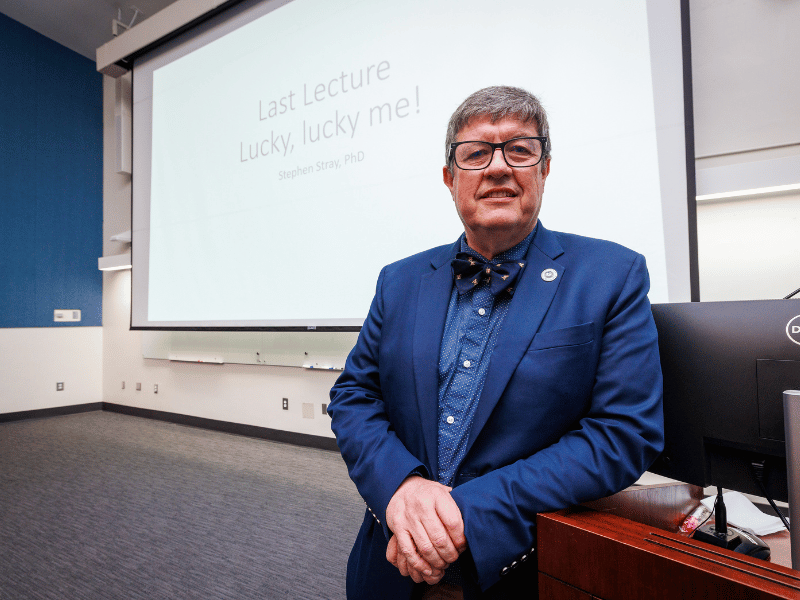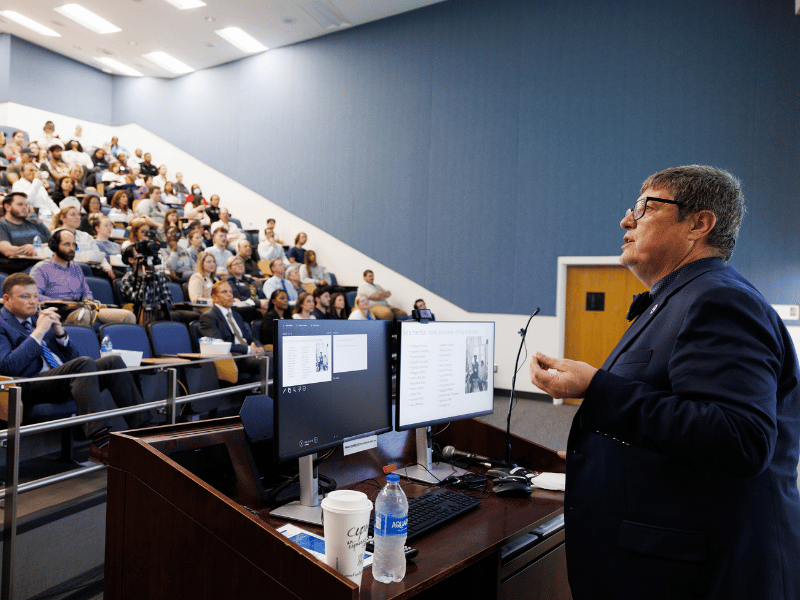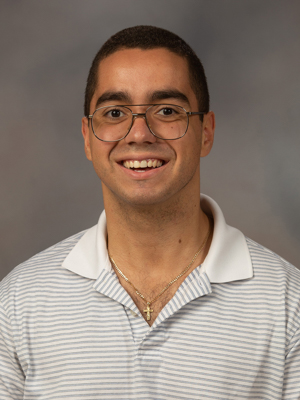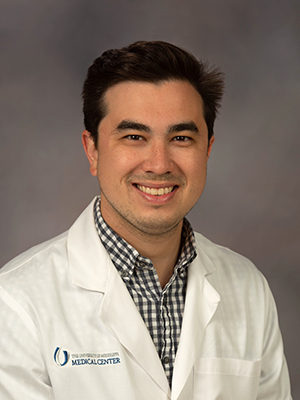Listen and engage: Stray delivers ‘Last Lecture’

For Dr. Stephen Stray, it’s all about being relatable when it comes to being the best he can be, whether with students or in the lab.
It’s especially so when one of the many aspiring health professionals in his courses today might come from a humble beginning, as many of his mentors in life did while growing up in the southeastern Australian state of Victoria.
“I’m a first-generation college student,” said Stray, professor of cell and molecular biology, last week during the 2024 Last Lecture at the University of Mississippi Medical Center. “My dad started work literally the day after he turned 17 and before he could even have a driver’s license in Australia. My mom graduated high school and then started raising carpet moths for the Commonwealth Scientific and Industrial Research Organization.
“I attended a one-room schoolhouse, where one man taught every class between first grade and sixth grade. This guy was incredible. It was really the point where I grew out of wanting to be an astronaut – which is what every other little boy who was alive in July 1969 wanted. I wanted to do something meaningful and realistic with my life, and that was to become a teacher.”
Presented by the Office of Development-Alumni Engagement, the Student Alumni Representatives (STARS) and the Associated Student Body, the Last Lecture is an occasion for selected faculty members to hold forth as if it is their last chance to pass on words of wisdom.

Chosen from among a slate of nominees, each Last Lecture honoree is part of a tradition adopted by many other institutions of higher learning since 2007. It began with a Carnegie Mellon University professor, Randy Pausch, a pancreatic cancer patient. Aware of his terminal diagnosis, Pausch presented the original Last Lecture, offering insights turned into a best-selling book.
Stray became UMMC’s eighth Last Lecturer. He joined the UMMC faculty in 2006 and holds a BS with honors from the University of Melbourne (Australia) and earned a PhD from the University of Alabama at Birmingham.
Students, who played a part in his selection as this year’s speaker, learned a few things for the first time about their highly-regarded professor.

“I didn’t know he was a first-generation college student,” said Alex Velazquez, a third-year medical student and STARS member. “What made Dr. Stray such a strong candidate for this year’s Last Lecture was how much education has affected him. His contributions to immunology and virology are immense and impactful. Education truly means something to him.”
The course director for medical microbiology and one of many co-founders for the Medical Center’s Academy for Excellence in Education was also quite likely the first to incorporate a little Bing Crosby and Ice-T with his presentation theme.
“Lucky, lucky me,” his first presentation slide displayed, echoing the beginning of “I’ve Got a Pocketful of Dreams” from the 1938 musical comedy Sing You Sinners. Another slide dealt with engaging with those with different ideas with a quote from rapper-turned-actor Ice-T – “If you’re thinking what I’m thinking, only one of us is thinking.”
Stray expounded on his biggest inspirations in life, including his own family and those with whom he’s worked and studied in a nearly 40-year career focusing largely on virus evolution and developing tools based on virus studies to treat cancer.
“My maternal grandmother, May Boardman, was an elementary and middle school teacher who started doing that fresh out of the 10th grade,” he said. “Because in 1919 Australia, that was the only qualification you needed.
“My paternal grandmother, Pauline Stray, grew up in poverty and had a really great life with my grandfather. At age 87, she became a widow. She dealt with the change with grace and humor. She was still knitting for grandchildren and babies well into her hundredth year.” (She died in 2022, at 102).
Stray’s father, John Stray, was diagnosed with ALS in 2022.
“He went from being a 79-year-old shearing sheep on the family farm to someone who is now severely debilitated. Now, I could not handle that graciously, but my father has. It’s amazing to watch the adaptations he’s made as he loses more and more every day. Having that level of commitment just to keep moving and putting one front in front of the other inspires me with any minor problem I’m dealing with.
“I’m really grateful every day for these people and the effect they’ve had on my life.”
Those he counts as his professional mentors include a who’s who of molecular biologists and researchers.
Dr. Gillian Air, recently retired as professor of Biochemistry and Molecular Biology and associate dean of the graduate college at the University of Oklahoma Health Sciences Center, was his PhD adviser and a post-doctoral fellow of Fred Sanger, a two-time Nobel Prize winner who in 1977 worked with a team of fellow researchers that sequenced the Phi X 174 genome, which eventually led to the sequencing of the entire human genome.
His own post-doctoral connections can be traced back to Max Perutz, the 1962 Nobel Prize winner for chemistry who, along with John Kendrew, studied the structure of hemoglobin and myoglobin.
“So much of what we understand about conditions like sickle cell anemia are from findings Max made basically from doing calculations made on the backs of envelopes,” Stray said. “When we hosted Max Perutz at UAB, I was the one who gave him the tour of campus. He had these whole stacks of scraps of paper of things he was working on.
“The lessons I’ve learned from these people are extraordinary. I talked with Fred Sanger on the telephone once, but I met all the others. I’m very fortunate to stand in those particular lineages because it gives me a connection to understanding the world in entirely new ways.”
Stray’s other suggestions for his audience included personal health, engaging with people with different ideas, being an effective listener, having role models and mentees, having a higher purpose beyond oneself and dealing with change with grace.

“Dr. Stray was a heavily influential figure in my path to allergy,” said Dr. Charles Grogan, assistant professor of medicine and pediatrics and medical director of adult allergy. Grogan was among those on Stray’s list of former students who have become health care providers.
“His love of fundamental science was infectious, and I am very thankful to have been his student and colleague,” he said.
Among Stray’s words of wisdom are:
- “Have a higher purpose even if you don’t have a higher power,” he said. “Everyone is here because they want to do something good for other people. All the major religions enshrine the principle of doing unto others as you would have them do unto you. It’s the guiding principle that gives my life direction.”
- “Get out of your comfort zone,” he said of personal engagement with others. “It’s part of being a well-rounded individual. Chances are, if you can put aside negative feelings and assumptions about people you’re talking to, who come from a different political or ethnic background, you’ll find we all have way more in common than we have differences.”
- “It’s OK to curse the darkness, but you still need to light a candle,” he said on handling change gracefully. “Students and patients entrust their lives and future careers into our hands every day,” he said.
“Randy Pausch’s book talked about living out your childhood dreams. We all have dreams, but I know everyone in this room has a calling. And that’s a very different thing. You’re here because this is your calling; not something you dreamt about. It tapped you on the shoulder and won’t let go.”
He ended the 45-minute lecture by explaining and singing the title of his opening slide.
“In the words of an old song my grandmother loved: ‘Lucky, lucky me. I can live in luxury. ‘Cause I’ve got a pocketful of dreams,’” he said.


